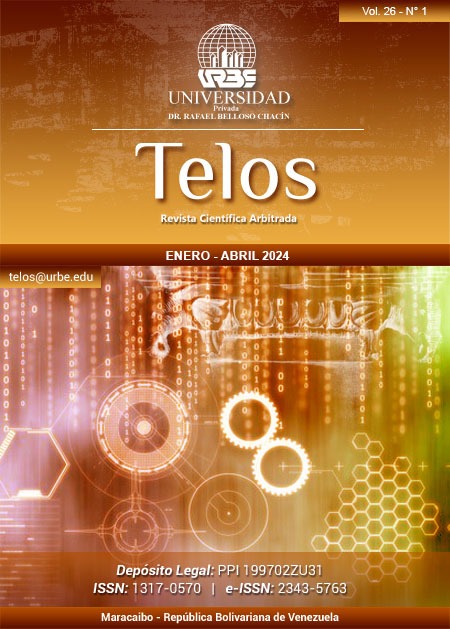HUMAN RIGHTS AND THE PEDAGOGY OF FEAR: A READING OF “IN THE CONSTRUCTION TO THE GREAT WALL OF CHINA” FROM KAFKA
DOI:
https://doi.org/10.36390/telos261.14Abstract
The work seeks to establish a dialogue between Law, Literature, and Political Philosophy on what Giorgio Agamben calls "impolitic of exile," and which is perpetrated by the West against people who seek survival through migration, in many cases fleeing wars provoked and/or financed by the same States that deny them protection and shelter. In the Kafkanian text that serves as a paradigm for this work, the narrator, who was one of the thousands of people who worked in the Construction of the Great Wall of China, describes the reasons, circumstances, and first construction activities in which, on the one hand, the bureaucratic and unquestionable decision to carry it out, and on the other hand the justification for it, named in this text as the pedagogy of fear. Fear from who? Of the northern barbarians, identified as monstrous figures. To us, this method is a particular aspect of globalization because things that do not have personality have free transit by the frontiers; persons with fundamental human rights are prohibited from migrating and searching for a new and good life. The great contradiction: things have a price; persons, value, and according to the political philosophy of Kant, only what has value is genuinely important; things are substitutable. And this is the most contradiction of globalization: the minus value of human beings and their fundamental rights. The work is based on the transdisciplinarity methodology, characterized by dialogue between knows – in this case, International Human Rights Law, literature, and Political Philosophy - and criticism, adopting the prevalence of fundamental principles of Human Rights as a way of protecting human beings in exile.
Downloads
References
Agamben, G. (2005). Estado de excepción: Homo sacer II, 1, 2 (F. Costa, I. Costa Trad.). Adriana Hidalgo.
Agamben, G. (2013). Política do exílio (M. V. X. de Oliveira Trad.). In Danner, Fernando & Danner, Leno Francisco, Temas de filosofia política contemporânea. Editora Fi.
Agamben, G. (2017). Remnants of Auschwitz: The witness and the archive (D. Heller-Roazen Trad.). Stanford University Press.
Agamben, G. (2008). Signatura Rerum: Sul metodo. Bollati Boringhieri.
Arendt, H. (2005). A condição humana (R. Raposo Trad.). Forense Universitária.
Arendt, H. (1989). Origens do Totalitarismo: Anti-semitismo, imperialismo, totalitarismo (R. Raposo Trad.). Cia das Letras.
Bakia, E. (2017). La muralla china. https://emakbakea.wordpress.com/2017/03/25/la-muralla-china/
Baumann, Z. (2006). How to be a Sociologist and a Humanist? Sociology as a Vocation in Liquid-Modern Times. In Eliaeson, Sven, Building Democracy and Civil Society East of the Elbe: Essays in Honour of Edmund Mokrzycki. Routledge.
De Oliveira, M. V. X. (2014). Guerra ao terror: Da biopolítica à bioguerra. Editora Fi.
De Oliveira, M.V. X. (2022). Mi odio será tu herencia. El derecho al medio ambiente sano, pacto intergeneracional y la “esperanza” de una nueva tierra desde Banksy. In Estudos e interlocuções em Direito Internacional, Filosofia Política e Literatura. Editora De Castro
Foucault, M. (2007). A governamentalidade. In Microfísica do Poder (R. Machado & A. L. de Souza Trad.). Graal.
Foucault, M. (2002). Em defesa da sociedade (M. E. Galvão Trad.). Martins Fontes.
Foucault, M. (2005). História da sexualidade I: A vontade de saber (M. T. da C. Albuquerque & J. A. G. Albuquerque Trad.). Forense Universitária.
Foucault, M. (2006). Seguridad, territorio, población (H. Pons Trad.). Fondo de Cultura Económica.
Habermas, J. (2003). Intolerance and discrimination. International Journal of Constitucional Law, 1(1), 2-12.
José Bremer, J. (2013). De Westfalia a post-Westfalia: Hacia un nuevo orden internacional. Universidad Nacional Autonoma de México/Instituto de Investigaciones Jurídicas.
Kafka, F. (1993). Selected short stories of Kafka (W. Muir & E. Muir Trad.). Handom House.
Kant, I. (2013). A metafísica dos costumes (D. K. Trevisan Trad.). Editora Universitária São Franscisco.
Miranda, J. (2005). Teoria do Estado e da constituição. Forense.
Müller, F. (2004). Fragmentos (sobre) o poder constituinte do povo (P. Neumann Trad.). RT.
Resta, E. (2004). O direito fraterno (S. R. M. Vial Trad.). Edunisc.
Rovighi, S. V. (2002). História da Filosofia Moderna: Da Revolução Científica a Hegel (M. Bagno & S. C. Leite Trad.). Loyola.
Schmitt, C. (2006). Teologia política (E. Antoniuk Trad.). Del Rey.




